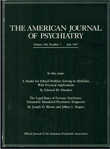Self-Report Ratings and Informants' Ratings of Personalities of Depressed Outpatients
Abstract
OBJECTIVE: This study sought to determine whether personality traits of depressed pa~tients could be assessed similarly by informants and self-reports of the patients themselves. METHOD: Forty-six depressed outpatients completed the self-report (first-person) version of the Revised NEO Personality Inventory and nominated informants who knew them well to complete the third-person version of that instrument. RESULTS: Agreement between the self-ratings and informants' ratings on the five factors of the inventory—neuroticism, extraversion, openness-to-experience, agreeableness, and conscientiousness—was high. The only significant difference between the self-ratings and informants' ratings was on the extraversion scale, where the patients rated themselves as significantly more introverted than did the informants. CONCLUSIONS: Informants' ratings of personality are similar to self-report ratings of depressed patients. Depressed mood may not influence the self-report of personality traits.



